最新人教版九年级英语单元测试题全册含答案
- 格式:doc
- 大小:1008.08 KB
- 文档页数:147
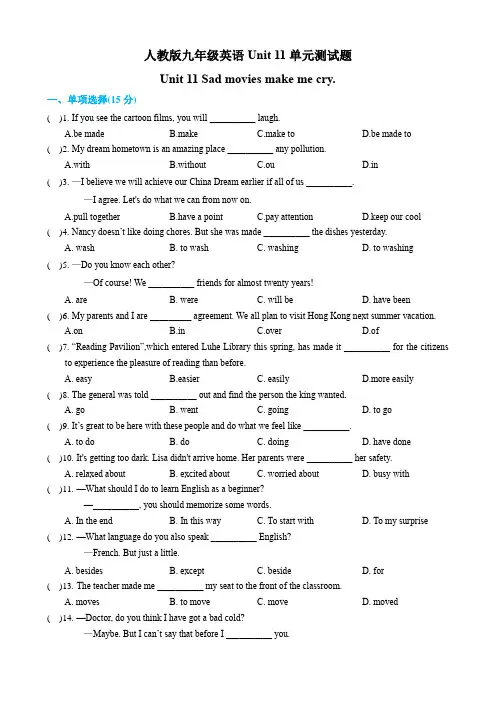
人教版九年级英语Unit 11单元测试题Unit 11 Sad movies make me cry.—、单项选择(15分)( )1.If you see the cartoon films, you will __________ laugh.A.be madeB.makeC.make toD.be made to( )2.My dream hometown is an amazing place __________ any pollution.A.withB.withoutC.ouD.in( )3.—I believe we will achieve our China Dream earlier if all of us __________.—I agree. Let's do what we can from now on.A.pull togetherB.have a pointC.pay attentionD.keep our cool( )4.Nancy doesn’t like doing chores. But she was made __________ the dishes yesterday.A. washB. to washC. washingD. to washing( )5.—Do you know each other?—Of course! We __________ friends for almost twenty years!A. areB. wereC. will beD. have been( )6.My parents and I are _________ agreement. We all plan to visit Hong Kong next summer vacation.A.onB.inC.overD.of( )7.“Reading Pavilion”,which entered Luhe Library this spring, has made it __________ for the citizens to experience the pleasure of reading than before.A. easyB.easierC. easilyD.more easily( )8.The general was told __________ out and find the person the king wanted.A. goB. wentC. goingD. to go( )9.It’s great to be here with these people and do what we feel like __________.A. to doB. doC. doingD. have done( )10.It's getting too dark. Lisa didn't arrive home. Her parents were __________ her safety.A. relaxed aboutB. excited aboutC. worried aboutD. busy with( )11.—What should I do to learn English as a beginner?—__________, you should memorize some words.A. In the endB. In this wayC. To start withD. To my surprise( )12.—What language do you also speak __________ English?—French. But just a little.A. besidesB. exceptC. besideD. for( )13.The teacher made me __________ my seat to the front of the classroom.A. movesB. to moveC. moveD. moved( )14.—Doctor, do you think I have got a bad cold?—Maybe. But I can’t say that before I __________ you.A. createB.warnC.examineD.prove( )15.n every __________ there has to be some give-and-take.A. friendshipB.instrumentC. attentionD.blackboard二、完形填空(20分)An old woman lost her only son. The sad woman went to a clever man and asked, “Is there any way I can throw away my 1._________?”The clever man said to her, "Go and bring 2._________ a seed (种子)from a home that has never known sadness. I will 3._________ it to drive the sadness out of your life. " The woman went off at once to look 4._________ that magical seed.First, she came to a beautiful house, knocked at the door, and asked 5._________, “Excuse me, I am looking for a home that has never known sadness. Is this such a place? It is very important to me.”They told her, “You’ve certainly come to the 6._________ place,” and began to describe all the sad things that had recently happened to them.The woman said to herself, "Who is able to 7._________ these people that have had such sadness like me?" She stayed to cheer them up 8._________ she went on looking for a home that had never known sadness.But wherever she went, whether in the homes of the poor or the rich, she found one sad 9._________ after another. She became so busy helping other people that she 10._________ about looking for a seed that would magically end her own sadness. She even never realized that her helping others had driven the sadness out of her life.( )1.A. happiness B. kindness C. sadness D. illness( )2.A. me B. you C. her D. him( )3.A. push B. use C. lend D. lose( )4.A. at B. up C. for D. after( )5.A. politely B. happily C. proudly D. angrily( )6.A. right B. wrong C. clean D. dirty( )7.A. catch B. order C. hide D. help( )8.A. before B. after C. when D. while( )9.A. man B. woman C. story D. trip( )10.A. knew B. worried C. thought D. forgot三、阅读理解(30分)( A )A team is a group of people with a common goal. A school’s football team has two goals. One goal is to win. That is what the team wants to do. The other goal is to build character. Character is what a person values, how a person gets along with others. That is why schools have football teams. They want to help students build good values.Each team member builds character. They learn to cooperate(合作). They learn to make good decisions.They work hard They practice every day. They learn to follow the rules.Each team member has a position. Each position is part of winning. No player has the ability to win the game for the team. Only if the team works together does a team win. People often say, “There is no I in TEAM,”Whether the team wins or loses, at the end of the game they congratulate the other team. That is called sportsmanship. While they fight to win during the game, it is just a game. They cannot be angry with the other team. If they are,they’ll hear from their coach._________makes sure the team reaches the school’s goal. The coach cares about the whole team. The coach gives each player advice. When the team wins, everyone celebrates. And the coach is glad But after the season is overt the coach is still happy. The coach gets to see the players as they go to school every day. The character they have built is part of their success in school,too.Some coaches say that if you go into a classroom at their school you’ll be able to tell the players. It is not that they are bigger than the other students. It is the ones who are helping other students work. Teamwork is part of their lives.( )1.Schools build football teams mainly to help studentsA. get good gradesB. become leadersC. build good valuesD. improve football skills( )2.What does the underlined sentence “There is no I in TEAM.” in Paragraph 3 mean?A. I never take part in the game.B.I am not a member of the team.C.A famous star is the key to success.D. Teamwork comes first during the game. ( )3.Which of the following can be put in the blank in paragraph 5?A. The captainB. The coachC. The headmasterD. The monitor( )4.Some coaches think football players are different from others because they are_______.A. tallerB. biggerC. more helpfulD. more talented( )5.Teamwork is part of__________ lives.A. the coaches’B. the teachers’C. the students’D. the players’( B )Traveling to every part of the world gets easier, but how well do we know and understand each other? Here5s a simple test. Imagine you are planning to hold a meeting at four o'clock. What time should you expect your foreign business friends to arrive? If they are Germans,they'll arrive on time. If they are Americans, they'll probably be 15 minutes early. If they are the British,they'll be 15 minutes late, and you should allow up to an hour for the Italians.The British seemed to think since the English language was widely used in the world, people wouldalways understand what they do. However,they found they were completely wrong. For example,the British are happy to have a business lunch,discuss business matters and have a drink during the meal. The Japanese prefer not to work while eating. Lunch is a time for them to relax and get to know each other and they don t drink at lunchtime. The Germans like to talk business before dinner. The French like to eat first and talk afterwards. They have to be well fed and watered before they discuss anything.( )1.What do the Germans prefer when they go to a meeting?A.They prefer to be on time.B.They prefer to arrive very early.C. They prefer to arrive very late.( )2.According to the text,if a group of Englishmen,Americans and Italians hold a meeting,who will be the last to arrive?A. The British.B. The Americans.C.The Italians.( )3.What do the Japanese like to do at lunchtime?A.To drinkB.To get to know each other.C.To talk business.( )4.According to the writer, the British like to _________.A.arrive on time and talk business during the mealB.arrive 15 minutes late and talk business after the mealC.arrive a few minutes late and discuss business during the meal( )5.By giving us the two examples, the writer means to show us that _________.A.different countries have different cultures in different parts of the worldB.the Germans are more serious and have better living habitsC.the Italians are careless people and they are never on time for everything( C )( )1.Which of the following can you do according to the Fun dubbing?A.Watch long funny videos.B.Learn more new words.C.Improve your written English.D.Only watch some old videos. ( )2.The K has the following functions except _________.A.it can record your voiceB.it can score your singingC.you can compete with your friendsD.you can get help from a superstar ( )3.ShaiShufang can be used for _________.A.practicing singingB.learning EnglishC.reading more but spending lessD.selling books more easily( )4.W hat do these apps have in common?A.They are all for fun.B.Their functions are all single.C.They are all helpful to English learning.D.They can all make life convenient and interesting.( )5.What does the text mainly talk about?A.Some useful apps.B.The users of the apps.C.Great changes around us.D.How to choose proper apps.四、完成对话(七选五)(10分)A:Alan, did you have a good time at Alice’s birthday party last night?B:Well, yes and no.A:1.______________________________B:At first, a girl next to me kept talking loudly when we were eating. 2.____________________________ A:I agree. Talking loudly while eating isn’t polite. 3.______________________________B:After the meal, I came to another room and began to watch a movie on TV.A:How did you feel about the movie?B:It was scary. 4.______________________________A:So you stopped watching it, right?B:Yeah, just then Alice came to me and invited me to dance with her. 5.____________________________I really enjoyed myself in the end.1.没有人想和他聊天,他感到被忽略了。
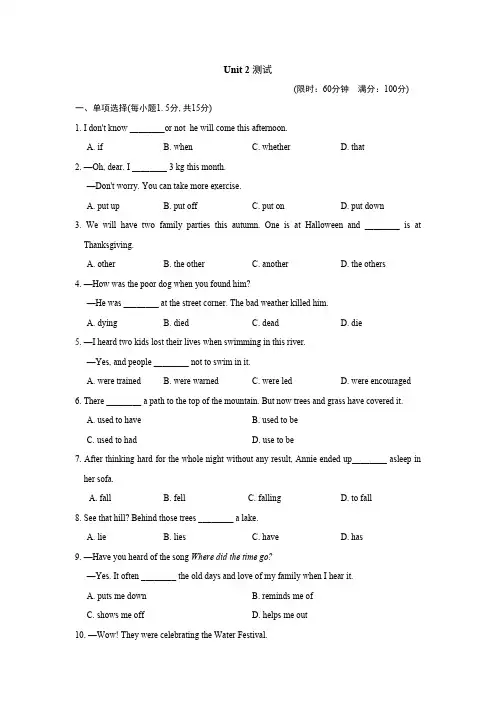
Unit 2 测试 (限时:60分钟 满分:100分)一、单项选择(每小题1. 5分, 共15分)1. I don't know ________or not he will come this afternoon.A. ifB. whenC. whetherD. that2. —Oh, dear. I ________ 3 kg this month.—Don't worry. You can take more exercise.A. put upB. put offC. put onD. put down3. We will have two family parties this autumn. One is at Halloween and ________ is at Thanksgiving.A. otherB. the otherC. anotherD. the others4. —How was the poor dog when you found him?—He was ________ at the street corner. The bad weather killed him.A. dyingB. diedC. deadD. die5. —I heard two kids lost their lives when swimming in this river.—Yes, and people ________ not to swim in it.A. were trainedB. were warnedC. were ledD. were encouraged6. There ________ a path to the top of the mountain. But now trees and grass have covered it.A. used to haveB. used to beC. used to hadD. use to be7. After thinking hard for the whole night without any result, Annie ended up________ asleep in her sofa.A. fallB. fellC. fallingD. to fall8. See that hill? Behind those trees ________ a lake.A. lieB. liesC. haveD. has9. —Have you heard of the song Where did the time go?—Yes. It often ________ the old days and love of my family when I hear it.A. puts me downB. reminds me ofC. shows me offD. helps me out10. —Wow! They were celebrating the Water Festival.—________ the Dai people were having!A. What funB. How funC. What a funD. How a fun二、完形填空(每小题1. 5分, 共15分)The Reader is a popular TV show. It invites different people to read aloud on the stage. The______11also tells the moving stories behind those people. They can read everything________12poems, books, and letters. By reading aloud, the words on the paper come to________13.Many people are fans of the show. They begin to________14reading aloud at home. Now, the show gives people a________15place to read across China. It is a reading pavilion(朗读亭). They are in many cities, including Shanghai, Hangzhou and Xi'an.The pavilion is very________16. Only one person can come into it each time. There is a microphone in it and it________17people's voices. Everyone can read for three minutes in the pavilion. They can read________18they like. The show will pick some of the readers and invite them to read on TV.People of all________19read in the pavilion. “Reading should be just like singing and talking, ”said Dong Qing, the producer of the show. “We can express our true________20by reading aloud. ”11. A. show B. lesson C. research D. play12. A. in B. such as C. with D. at13. A. light B. reason C. life D. purpose14. A. mind B. hate C. finish D. enjoy15. A. special B. strange C. beautiful D. wonderful16. A. wide B. small C. tall D. big17. A. makes B. uses C. records D. improves18. A. nothing B. everything C. someone D. everyone19. A. comers B. others C. ages D. passersby20. A. feelings B. points C. spirits D. aims三、阅读理解(每小题3分, 共15分)We spoke to three students from around the world about different national holidays. There are different customs for each festival.Tan Xiaodong, 15, Hong Kong, China“It'll soon be the Chinese New Year. Before it, we'll clean the house and decorate (装饰) it for good luck. Every shop is going to close for a few days and we'll go out a lot to celebrate in the streets. We might go and see the lion and dragon dances in the city center. I love this festival. ”Wendy, 16, Sydney, Australia“Australia Day is on 26th January and it's an important holiday here. We always have a Monday off, so we celebrate for three days. My parents and I go to the countryside for a picnic and friends always come over. Many people go to beach parties or street parties and there is lots of music and dancing. What fun! ”Amy, 14, New York, USA“The first Thanksgiving Day was hundreds of years ago when Europeans who came to America thanked God for his help. It's still a very important day for families to be together. This year we're going to visit my grandparents and we'll eat a delicious meal of turkey. Thanksgiving Day is on the fourth Thursday in November every year. ”21. How many festivals are mentioned in the passage?A. Two.B. Three.C. Four.D. Five.22. During the Chinese New Year, tourists might ______ according to the passage.A. do a lot of shoppingB. eat turkeyC. go to beach partiesD. see lion and dragon dances23. On Australia Day, Wendy and her parents often ______.A. have a picnic in the countrysideB. go to a swimming poolC. have a party at schoolD. clean the house and dance24. What do you think “turkey” is in this passage?A. A country.B. A festival.C. A kind of food.D. A kind of drink.25. From the passage, we can learn that ________.A. Amy is from Sydney, AustraliaB. different festivals have different customsC. many people go out for a picnic with friends before the Chinese New YearD. Thanksgiving Day is on 26th January in the USA四、词汇运用(每小题1分, 共10分)A) 根据句意及汉语提示填空26. Why did you think John________(偷)David's money yesterday?27. To avoid mistakes in your writing, you should write more ________ (仔细)and more slowly.28. Whenever I heard Mom's voice on the phone, the ________(温暖)always excited me.29. The Spring Festival is a holiday for ________ (亲戚) and families to get together.30. Drinking tea is a ____________ (传统的) custom in China.B) 用括号内所给单词的正确形式填空31. Many thanks for your ________(kind).32. His grandpa has been ________(die) for ten years.33. Lily is very kind and she always treats others ______(nice).34. He opened the door and found a letter ________(lie) on the floor.35. Her sister hasn't come back, so her parents look ________(real) worried.五、短文填空(每小题1. 5分, 共15分)The Chongyang Festival is a traditional Chinese festival. It is celebrated on the ninth day ofthe ninth lunar month. It's also________36 (call) the Double Ninth Festival.The festival started as________37 (early) as the Warring States Period (475—221 BC) . It has a history of more than 1, 700 years. Among the numbers from zero to nine, nine is the________38(high) odd number (奇数). People believe that two “nines” meeting together stand for a long life. So it is a special holiday________39Chinese people to show love and respect for their elders. They hold many________40(kind) of activities in honor of old people, wishing them good________41(healthy) and a long life.The festival comes during the golden time of______42 (fall). On the day, people traditionally drink chrysanthemum (菊花)wine, eat the Double Ninth cake________43climb mountains. They also carry a kind of plant named dogwood. People in ancient times believed that______44 plant could drive away evil (邪恶的)spirits and prevent them from________45(catch) an illness in winter.六、书面表达(30分)假如你叫张明, 你的外国朋友John发来邮件, 请你介绍中国的传统节日。
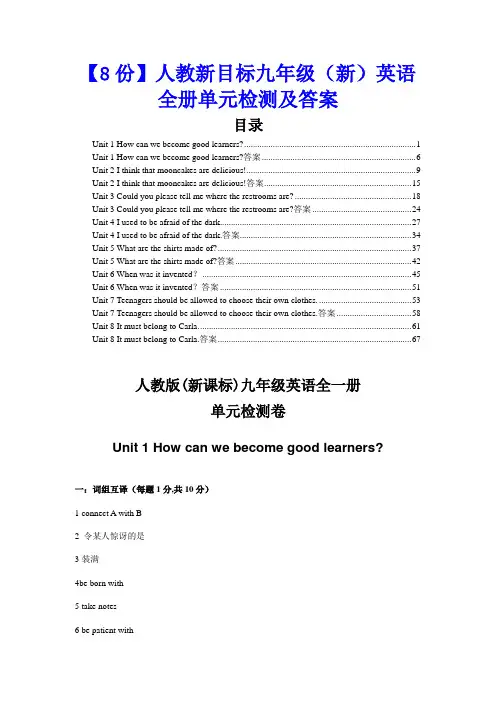
【8份】人教新目标九年级(新)英语全册单元检测及答案目录Unit 1 How can we become good learners? (1)Unit 1 How can we become good learners?答案 (6)Unit 2 I think that mooncakes are delicious! (9)Unit 2 I think that mooncakes are delicious!答案 (15)Unit 3 Could you please tell me where the restrooms are? (18)Unit 3 Could you please tell me where the restrooms are?答案 (24)Unit 4 I used to be afraid of the dark (27)Unit 4 I used to be afraid of the dark.答案 (34)Unit 5 What are the shirts made of? (37)Unit 5 What are the shirts made of?答案 (42)Unit 6 When was it invented? (45)Unit 6 When was it invented?答案 (51)Unit 7 Teenagers should be allowed to choose their own clothes. (53)Unit 7 Teenagers should be allowed to choose their own clothes.答案 (58)Unit 8 It must belong to Carla. (61)Unit 8 It must belong to Carla.答案 (67)人教版(新课标)九年级英语全一册单元检测卷Unit 1 How can we become good learners?一:词组互译(每题1分,共10分)1 connect A with B _______________________2 令某人惊讶的是_______________________3装满_______________________4be born with_______________________5 take notes______________________6 be patient with_______________________7 以..........为自豪_______________________8参加_______________________9 在星期三的晚上_______________________10 have the ability to do sth.______________________二:词性转换(每题1分,共10分)1 increase(反义词)__________2 loud(反义词)__________3 big(反义词) __________4 able(反义词)__________5 patient(对应词)__________6 many(最高级)__________7 well(比较级)__________8 wise(比较级)__________9 express(比较级)__________ 10 little(比较级)__________ 三:单选(每题1分,共15分)1) There is _______in the box. Guess what it is!A somethingB nothingC anythingD everything2) There is ____knocking at the door. Go and see who it is.A nobodyB somebodyC anybodyD everybody3)The old woman kept one black dog and two white_______.A oneB onesC thoseD one‟s4)Miss brown will teach _____English next term.A usB weC ourD ours5)I‟ve got ____to tell you.A somethingB anythingC everythingD nothing6)The text is very easy for you. There are __new words in it.A a fewB a littleC fewD little7)There will be ______in tomorrow‟s newspaper.A new somethingB new anythingC something newD anything new8)My aunt _____at least 35 years old this year.A must beB can beC would beD will be9)I often fish for hours without ______anything.A catchB caughtC catchingD being caught10)Twenty percent of the teachers in our school are_____A women teachersB women‟s teachersC woman teachersD woman‟s teachers11)Will you _____the basketball match tomorrow?A take partB take part inC joinD join in12)He is _____to look after himself.A enough oldB old enough Cold D hardly old13) The play was very_______A interestingB interestedC to interestD interest14) _____exciting news it is!A whatB what an Chow D how an15) ______do you go to see your parents?A how soonB how oftenC how longD how much四:句型转换(每小题2分,共10分)1 He has been here since yesterday.(划线提问)_________________________________________________?2 I have cleaned the floor twice. .(划线提问)_________________________________________________?3 It took me five yuan to buy the book.(用spend改写)___________________________________________4 Why don‟t you go with us?(同义句)_________________________________________________!5 My mother was ill two days ago(同义句)_________________________________________________!五:完形填空(每小题2分,共10分)Mark has a big garden and it is very nice. There 1____ some tall trees and beautiful flowers in the garden. Many birds like 2___in it , they often sing and dance there .There is a small lake .Mark usually 3_____games with his friends in the garden. His parents like fishing 4_____the lake. What about Mark‟s cat?5_____ sometimes sleeps in the streets .sometimes plays with a ball under the trees.1( )A am B is C are D was2( ) A live B lives C living D lived3( ) A play B plays C playing D played4( ) A in B under C by D for5( ) A it B it‟s C its D it has六:阅读理解(每小题2分,共20分)A1 Where is Wang Mei ?__________________________________________________________?2 Whose favourite color is pink ?__________________________________________________________?3 what color is Li Hui‟s skirt ?__________________________________________________________?4 is Liu Fang‟s dress new or old?__________________________________________________________?5)What‟s Liu Fang‟s favourite color?__________________________________________________________?BJack comes from London. He is thirteen. His father Mr. Green teaches English at a school in BeiJing. And his mother , Mrs . Green works in a big company in BeiJing. Jack has a brother . His name is Jerry. He is oily 6 years old. It is Sunday today. Jack‟s family are all at home. Mr. Green is sitting in a chair and watching TV. Mrs, Green is cooking in the kitchen. Jack is cleaning his bike. Where is Jerry? He is playing with little dog snoopy._( )1 where is Jack from?____A LondonB ChinaC CanadaD America( )2 His _______teaches English in Bei Jing .A motherB FatherC brotherD sister( )3 ______ is only six years old.A JackB Jack‟s FatherC Jack‟s sisterD Jack‟s Friend( ) 4 The family is very _____A sadB happyC hotD big( ) 5 How many people are there in the family______A threeB fourC twoD five七:作文(5分),根据下列表格提示写一篇小短文,内容可以拓展。
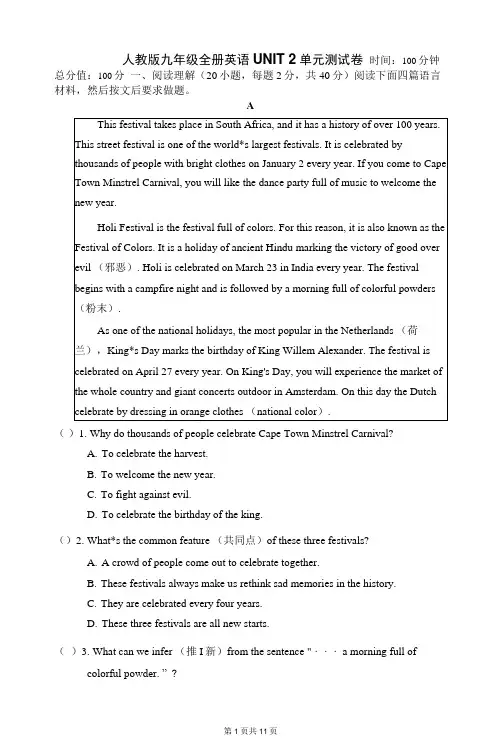
人教版九年级全册英语UNIT 2单元测试卷时间:100分钟总分值:100分一、阅读理解(20小题,每题2分,共40分)阅读下面四篇语言材料,然后按文后要求做题。
A()1. Why do thousands of people celebrate Cape Town Minstrel Carnival?A.To celebrate the harvest.B.To welcome the new year.C.To fight against evil.D.To celebrate the birthday of the king.()2. What*s the common feature (共同点)of these three festivals?A.A crowd of people come out to celebrate together.B.These festivals always make us rethink sad memories in the history.C.They are celebrated every four years.D.These three festivals are all new starts.()3. What can we infer (推I新)from the sentence " ・・・a morning full of colorful powder. ”第1页共11页Are you interested in the traditional Chinese festival? If so, could you come and celebrate the festival with us next year?Yours,Li Hua第10页共11页参考答案一、A)1—5:BADCDB)6—10: DABDCC)ll-15: DACBBD)16〜20: BAEDC二、21—25: DBAAB 26—30: DCBAD 31—35: CBABC --H-二、第一B36.are 37. second 38. mother's 39. get 40. themborn 42. older 43. usually 44. as 45.noodles H-弟一P46.because 47. It 48. to 49. of 50. are 四、51. Where did you go/What did you doDid they/your parents work there52.You used to have short hair/You had short hairCan you come to my house on thatdayAVould you like to come to my house on that day53.You're welcome/No problem/My pleasure 五、Dear Peter,The Dragon Boat Festival, also called Duanwu Festival, is a traditional festival in China. It is celebrated on the fifth day of the fifth month according to the Chinese calendar. People celebrate it to commemorate Qu Yuan, a famous poet. On that day, people in China often eat rice dumplings and have dragon boat races. On that day, I watch dragon boat races with my parents on TV in the morning. My father used to be a dragon boat player. He is a big fan of dragon boat races. Then I help to do some housework. I help my mother make rice dumplings at noon, and cook her favorite food in the evening.Are you interested in the traditional Chinese festival? If so, could you come and celebrate the festival with us next year?Yours, Li Hua第11页共11页A.Holi people don f t like white or black.B.Only children like playing with colors.C.People use the colorful powders to paint on the buildings and walls.D.Holi people play with colors (watercolors or colorful powders) with theirfriends and families.()4. What*s the national color of the Netherlands?A. Red.B. White.C. Orange.D. Blue.()5. Which of the following is NOT true?A.There is a dance party full of music on Cape Town Minstrel Carnival.B.Holi Festival is famous as the festival of colors.C.The Dutch celebrate by dressing in orange clothes.D.Indians like King's Day very much.BIn many countries around the world, May 1st is a holiday which is called Labor Day or Workers* Day. It is an interesting holiday that honors working people and their jobs. But do you know how it started?During the late 1880s, in many parts of the world, people worked for fourteen to sixteen hours a day in factories, but made very little money. Later, in the United States and Canada, working people got together to set up unions. The union (工会)leaders asked factory bosses for shorter working time and higher salaries ( I:资),but many of the bosses—A—.On May 1st, 1886, men and women in the United States and Canada stopped working and went onto the streets. They walked through cities and towns to force bosses to let them work eight hours a day. In the city of Chicago, several people died in fighting with the police. Over the next few years, people in cities around the world stopped working on May 1st to honor(尊敬)the workers everywhere. By the early twentieth century, the first of May became a national holiday in many countries.However, in the United States and Canada, May 1st is not a holiday. North Americans celebrate Labor Day on the first Monday in September. Today in the United States, Labor Day is mostly about having fun. People enjoy a long weekend and often celebrate it by having picnics with friends or family. In many parts of the第2页共11页United States, Labor Day is also the last day of summer vacation, and students return to school the next day.( )6. How long did people work a day in factories in the late 1880s?A. For 8一10 hours.C. For 12-14 hours.()7. Which can be the best for A?A. Refused their ideas.C. Agreed with them. ()8. What does the underlined word “force" mean?A.感激D.欣赏( )9. Which is the right order of the following events?©Working people began to fight for better life.②People stopped working on May 1st to honor workers.©Working people set up unions.A.①②③B.②①③C.③②①D.③①②( )10. How do people often celebrate Labor Day in America nowadays?A. By working all day.B. By giving gifts to working people.C. By having fun with friends or family.D. By having a big ceremony.COne dollar and eighty-seven cents. That was all. Three times Della counted it. One dollar and eighty-seven cents. And the next day would be Christmas. She could not afford a present, so she sat down and cried.Jim and Della had two possessions (贝才产)which they were both proud of. One was Jim's gold watch that was from his father and his grandfather. The other was Della's beautiful hair. It fell about her, and reached below her knee.Della put on her old brown jacket and her old brown hat. Then she went out of the door and down the stairs to the street.She stopped at a store. The sign in front of the store read “Hair Goods. " uWill 第3页共11页 you buy my hair? ” asked Della. u Twenty dollars, “ the woman said. B. For 10-12 hours. D. For 14 —16 hours.B. Accepted their ideas. D. Understood them. B.迫使C.宣扬 C.宣扬Then Della searched through the stores looking for a present for Jim.She found it at last. It was a watch chain. The bill was twenty-one dollars. At seven o'clock, the coffee was made and dinner was ready. Jim was never late. Della heard his steps on the stairs.The door opened and Jim walked in. He stopped inside the door. His eyes were fixed on Della, and there was an expression in them that she could not read.“Jim, " she cried, "don't look at me that way. I sold my hair to buy you a Christmas present. Jim drew a box from his pocket and put it on the table.Della opened it. There lay the set of combs (梳子)that she had always wanted. Now they were hers, but her hair was gone.She smiled and held out Jim's present. "I hunted all over town to find it. Give me your watch. I want to see how it looks on it. ”Instead of obeying (月艮从),Jim sat down, put his hands behind his head and smiled. "Della, “ he said, "I sold the watch to get the money to buy your combs.” ( )11. Why did Della count her money three times?A.Because she was not good at counting money.B.Because she had nothing to do but count money.C.Because she got different numbers each time she counted it.D.Because she wished she could have more money. ()12. How could Jim feel when he fixed his eyes on Della?A.Shocked.B.Excited.C. Embarrassed.D.Angry.()13. What does the underlined word “it" in Paragraph 10 refer to?A. The box.B.The watch.C. The watch chain.D.The set of combs.()14. What can we infer (推断)from the passage?A. They lived a rich life.B.They loved each other deeply.C.Della didn*t like her hair.D.They might have a fight at last.()15. What's the best title for the passage?第4页共11页A.Beautiful HairChristmas GiftsB.Disappointing ChristmasAncient PossessionsDMonica is an American living in China. She is talking about the Chinese Spring Festival.Chinese people have celebrated the Spring Festival (or Chinese New Year) for thousands of years! 16 Sometimes it falls in January.For every Chinese family, it is important to prepare for the holiday before it begins. For good luck, people clean their homes, and they buy themselves new clothes. And, of course, they buy lots of food to eat during the festival, including fish, meat, fruit, and candy.17 People put up red paper decorations on their front doors and windows.Several days before the festival, people who live far away from their families travel home to see their family members. 18 Families prepare special holiday foods together, such as dumplings or rice cakes. And the best part? Parents and grandparents give children red envelopes (信封)with money inside!19 They think breaking things might bring bad luck to them. In some places on New Year's Eve, "dragon dancers“ in beautiful costumes go from door to door, beating drums and setting off fireworks (放烟火)all night long. 20Even if you can*t come to China to experience this fun holiday, there are Chinese New Year celebrations all over the world. If you visit neighborhoods where Chinese people live in your country, you can enjoy the celebrations, too!根据材料内容,从下面五个选项中选出能填入文中空缺处的最正确选项,使文章意思通顺、内容完整。
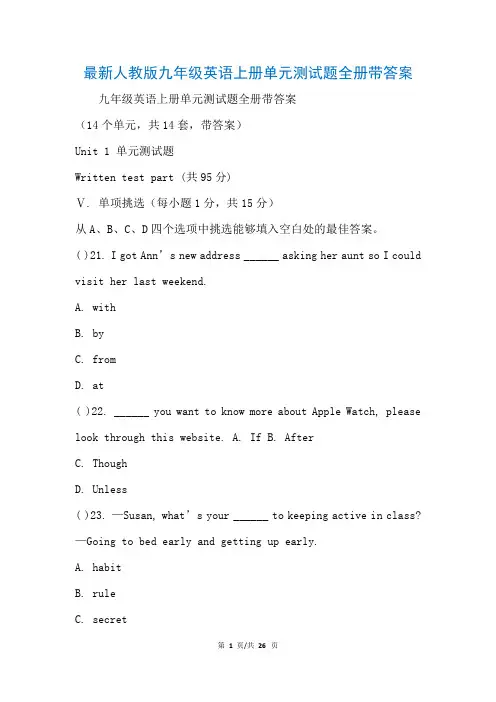
最新人教版九年级英语上册单元测试题全册带答案九年级英语上册单元测试题全册带答案(14个单元,共14套,带答案)Unit 1 单元测试题Written test part (共95分)Ⅴ. 单项挑选(每小题1分,共15分)从A、B、C、D四个选项中挑选能够填入空白处的最佳答案。
( )21. I got Ann’s new address ______ asking her aunt so I could visit her last weekend.A. withB. byC. fromD. at( )22. ______ you want to know more about Apple Watch, please look through this website. A. If B. AfterC. ThoughD. Unless( )23. —Susan, what’s your ______ to keeping active i n class? —Going to bed early and getting up early.A. habitB. ruleC. secretD. ability( )24. —Dad, why can’t I still play this music well?—Well, dear, just be ______. It takes time.A. relaxedB. creativeC. friendlyD. patient( )25. When Jack got into the classroom, he surprisingly ______ that nobody was there.A. discoveredB. repeatedC. memorizedD. remembered( )26. If you read a sentence and ______ each word that you don’t know in the dictionary, you’ll often misunderstand its meaning.A. pick upB. look upC. cut upD. mix up( )27. —What do you think of Jim?—He hardly speaks. It’s difficult ______ what he’s thinking.A. knowB. stopC. to knowD. to stop( )28. The movie Big Hero 6 is ______ interesting ______ I have watched it three times.A. enough; toB. such; thatC. too; toD. so; that( )29. Our teacher says that ______ we practice, ______ our spoken English will be.A. more; betterB. the more; the betterC. more; the betterD. the more; better( )30. Linda’s father is strict with her, so she is afraid ______ him what has happened to her. A. of telling B. to tellingC. of showingD. to showing( )31. —Jack, how’s it going with your English?—Not good. I ______ follow my teacher in class.A. shouldn’tB. needn’tC. won’tD. can’t( )32. —J enny, have you found ______ in today’s newspaper?—Yes. It’s all about N PC & CPPCC.A. everything specialB. special everythingC. special anythingD. anything special( )33. Kate’s parents often give her some pocket money and she uses it ______, so she still has some money by the end of each month.A. wiselyB. quicklyC. easilyD. completely( )34. —David,it’s warm and windy today. ______ flying a kite in the park?—Good idea. Let’s ask Tom to go with us.A. Why notB. Could you pleaseC. What aboutD. Would you like( )35. —I don’t have much work to do this week.—______. In fact, you need more time to relax.A. I hope notB. That doesn’t sound too badC. I agreeD. That’s a grea t ideaⅥ. 完形填空(每小题1分,共10分)先通读下面的短文,掌握其大意,然后从A、B、C、D四个选项中挑选能够填入空白处的最佳答案。
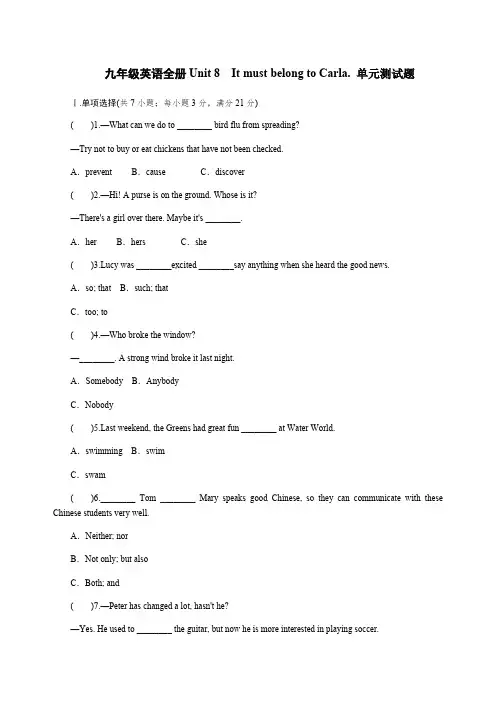
九年级英语全册Unit 8 It must belong to Carla. 单元测试题Ⅰ.单项选择(共7小题;每小题3分,满分21分)( )1.—What can we do to ________ bird flu from spreading?—Try not to buy or eat chickens that have not been checked.A.prevent B.cause C.discover( )2.—Hi! A purse is on the ground. Whose is it?—There's a girl over there. Maybe it's ________.A.her B.hers C.she( )3.Lucy was ________excited ________say anything when she heard the good news.A.so; that B.such; thatC.too; to( )4.—Who broke the window?—________. A strong wind broke it last night.A.Somebody B.AnybodyC.Nobody( )st weekend, the Greens had great fun ________ at Water World.A.swimming B.swimC.swam( )6.________ Tom ________ Mary speaks good Chinese, so they can communicate with these Chinese students very well.A.Neither; norB.Not only; but alsoC.Both; and( )7.—Peter has changed a lot, hasn't he?—Yes. He used to ________ the guitar, but now he is more interested in playing soccer.A.playing B.play C.playedⅡ.完形填空(共8小题;每小题3分,满分24分)One Sunday morning, Millie and Amy went to Sunshine Park. They love to chat there. As usual, they sat __8__ a big tree. Suddenly, they heard a whistle from the bushes behind the tree. They turned around but could not see anything unusual. They were __9__.“Is __10__ there?”Millie asked. Nobody answered. They __11__ very carefully and heard the strange noise again. The two girls were very afraid. They ran away quickly. On their way, they met Andy.“What happened?” Andy asked. “There's a ghost in the __12__. Please help us.” Millie said. “Really? Tell me more.” Andy said. Millie told Andy everything. Andy went to the park, __13__ beside the tree and listened carefully. Then he heard the noise! He looked behind the tree and heard another whisper. He was now sure the sound __14__ from the bushes. He searched carefully.“Oh! Here it is.” Andy said to himself. He __15__ a little cat in the bushes. It was very weak. When it miaowed(猫叫声), it made a sound like a whisper.( )8.A.under B.on C.behind( )9.A.excited B.frightenedC.frightening( )10.A.nobody B.everybodyC.anybody( )11.A.saw B.looked C.listened( )12.A.church B.park C.garden( )13.A.rose B.slept C.stood( )14.A.came B.learned C.heard( )15.A.smelled B.looked C.foundⅢ.阅读理解(共5小题;每小题4分,满分20分)Once upon a time, a boy was walking through a wood and he thought he could hear a sad cry. Following the sound he came to a big, round, mysterious, grey fountain. The sad sound seemed to be coming from the fountain pool. The boy swept aside the pool's dirty surface water and saw a group of grey fish swimming in a slow circle through the pond.Amused by this, the boy tried to catch one of these incredible talking fish. But when he stuck his arm into the water it turned grey right up to the elbow. As this happened, a huge sadness entered into him, and he suddenly understood how sad the fish were feeling.He quickly pulled his arm out of the water, and ran from that place. But the arm stayed grey, and the boy continued feeling sad. He tried so many times to cheer himself up, but nothing worked. That was, until he realized that if he were to make the earth happy then that happiness would be, in turn, transmitted back to him, through the earth on his arm.From then on, he set about looking after the countryside. He cared for the plants, and he did what he could to keep the water from being polluted. He encouraged others to do the same. He was so successful that his arm started to recover its normal color. When the grey had disappeared completely, he started feeling happy again, and he decided to go and visit the fountain. When he was still some way from the fountain he could hear the fish singing happily.( )16.What happened to the boy when he stuck his arm into the water?A.He caught some fish.B.His arm was bitten by the fish.C.He felt great sadness.( )17.The underlined word “recover” means “________” in Chinese.A.转变 B.恢复 C.变异( )18.Which of the following didn't happen after the boy left the fountain?A.He started to look after the countryside.B.His arm kept grey and he never felthappy.C.He encouraged people to protect theearth.( )19.What can we learn from the passage?A.We should protect the earth.B.We shouldn't catch fish.C.Even the fountain may cry.( )20.What is the best title of the passage?A.The Beautiful CountrysideB.The Talking FishC.The Grey FountainⅣ.任务型阅读(共5小题;每小题3分,满分15分)阅读短文,捕捉信息,根据短文内容完成文后的句子。
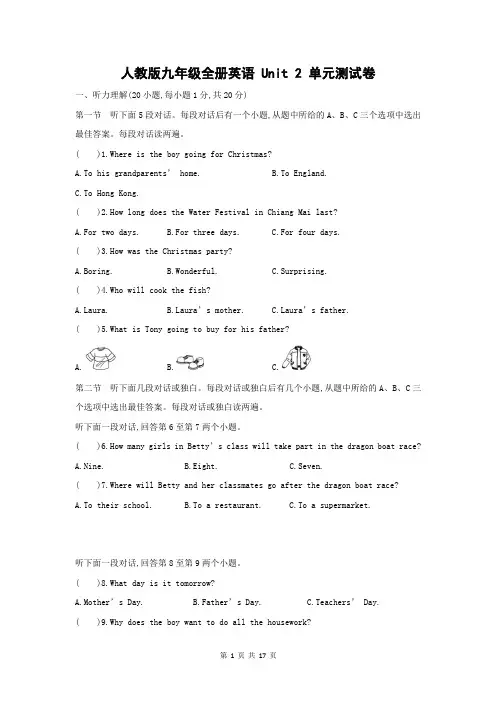
人教版九年级全册英语 Unit 2 单元测试卷一、听力理解(20小题,每小题1分,共20分)第一节听下面5段对话。
每段对话后有一个小题,从题中所给的A、B、C三个选项中选出最佳答案。
每段对话读两遍。
( )1.Where is the boy going for Christmas?A.To his grandparents’ home.B.To England.C.To Hong Kong.( )2.How long does the Water Festival in Chiang Mai last?A.For two days.B.For three days.C.For four days.( )3.How was the Christmas party?A.Boring.B.Wonderful.C.Surprising.( )4.Who will cook the fish?ura.ura’s mother.ura’s father.( )5.What is Tony going to buy for his father?A. B. C.第二节听下面几段对话或独白。
每段对话或独白后有几个小题,从题中所给的A、B、C三个选项中选出最佳答案。
每段对话或独白读两遍。
听下面一段对话,回答第6至第7两个小题。
( )6.How many girls in Betty’s class will take part in the dragon boat race?A.Nine.B.Eight.C.Seven.( )7.Where will Betty and her classmates go after the dragon boat race?A.To their school.B.To a restaurant.C.To a supermarket.听下面一段对话,回答第8至第9两个小题。
( )8.What day is it tomorrow?A.Mother’s Day.B.Father’s Day.C.Teachers’ Day.( )9.Why does the boy want to do all the housework?A.Because the girl advises him to do so.B.Because the boy thinks his mother must be tired after work.C.Because the boy’s mother does the housework slowly.听下面一段独白,回答第10至第12三个小题。
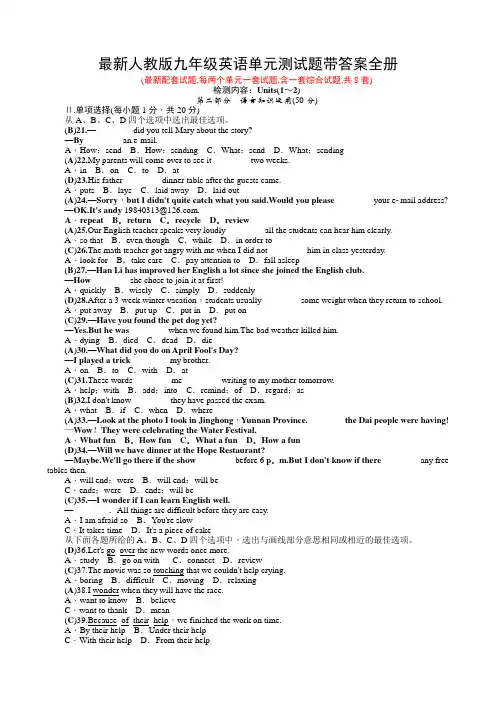
最新人教版九年级英语单元测试题带答案全册(最新配套试题,每两个单元一套试题,含一套综合试题,共8套)检测内容:Units(1~2)第二部分语言知识运用(50分)Ⅱ.单项选择(每小题1分,共20分)从A、B、C、D四个选项中选出最佳选项。
(B)21.—________ did you tell Mary about the story?—By ________ an e-mail.A.How;send B.How;sending C.What;send D.What;sending(A)22.My parents will come over to see it ________ two weeks.A.in B.on C.to D.at(D)23.His father ________ dinner table after the guests came.A.puts B.lays C.laid away D.laid out(A)24.—Sorry,but I didn't quite catch what you said.Would you please ________ your email address?—OK.It's andy ****************.A.repeat B.return C.recycle D.review(A)25.Our English teacher speaks very loudly ________ all the students can hear him clearly.A.so that B.even though C.while D.in order to(C)26.The math teacher got angry with me when I did not ________ him in class yesterday.A.look for B.take care C.pay attention to D.fall asleep(B)27.—Han Li has improved her English a lot since she joined the English club.—How ________ she chose to join it at first!A.quickly B.wisely C.simply D.suddenly(D)28.After a 3-week winter vacation,students usually ________ some weight when they return to school.A.put away B.put up C.put in D.put on(C)29.—Have you found the pet dog yet?—Yes.But he was ________ when we found him.The bad weather killed him.A.dying B.died C.dead D.die(A)30.—What did you do on April Fool's Day?—I played a trick ________ my brother.A.on B.to C.with D.at(C)31.These words ________ me ________ writing to my mother tomorrow.A.help;with B.add;into C.remind;of D.regard;as(B)32.I don't know ________ they have passed the exam.A.what B.if C.when D.where(A)33.—Look at the photo I took in Jinghong,Yunnan Province.________ the Dai people were having!—Wow!They were celebrating the Water Festival.A.What fun B.How fun C.What a fun D.How a fun(D)34.—Will we have dinner at the Hope Restaurant?—Maybe.We'll go there if the show ________ before 6 p.m.But I don't know if there ________ any free tables then.A.will end;were B.will end;will beC.ends;were D.ends;will be(C)35.—I wonder if I can learn English well.—________.All things are difficult before they are easy.A.I am afraid so B.You're slowC.It takes time D.It's a piece of cake从下面各题所给的A、B、C、D四个选项中,选出与画线部分意思相同或相近的最佳选项。
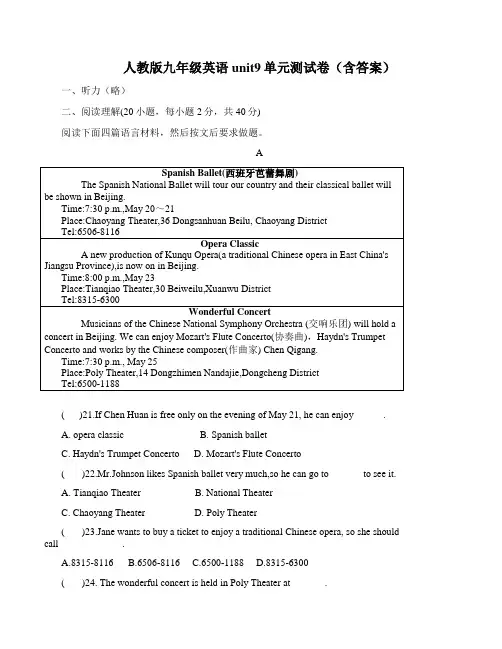
人教版九年级英语unit9单元测试卷(含答案)一、听力(略)二、阅读理解(20小题,每小题2分,共40分)阅读下面四篇语言材料,然后按文后要求做题。
A( )21.If Chen Huan is free only on the evening of May 21, he can enjoy______.A. opera classicB. Spanish balletC. Haydn's Trumpet ConcertoD. Mozart's Flute Concerto( )22.Mr.Johnson likes Spanish ballet very much,so he can go to_______to see it.A. Tianqiao TheaterB. National TheaterC. Chaoyang TheaterD. Poly Theater( )23.Jane wants to buy a ticket to enjoy a traditional Chinese opera, so she should call_____________.A.8315-8116B.6506-8116C.6500-1188D.8315-6300( )24. The wonderful concert is held in Poly Theater at_______.A.30 Beiweilu,Xuanwu DistrictB.36 Dongsanhuan Beilu, Chaoyang DistrictC.14 Dongsanhuan Beilu, Dongcheng DistrictD.14 Dongzhimen Nandajie, Dongcheng District( )25.You can enjoy all the entertainment in the city of______.A.ShanghaiB. TianjinC. BeijingD. NanjingBAre you interested in country music? I like it very much! It will take me away for a while when I am tired. The guitars and songs will take me to the mountains and fields.Country music usually talks of everyday life and feelings. It's the spirit of America, easy to understand, slow and simple.Country music developed in the Southern United States. It was the folk music of American countryside. Many songs tell about the lives of farmers. They talk about love, crops or death.The life of the countryside can be hard, so the words in country music are often sad. At first, people played the music only at family parties. But it became more popular later. In the 1920s, people played country songs on the radio, and they made them into records.When people in the countryside moved to towns and cities to look for work, they took their music with them. Country music continued to change and became popular across America.John Denver was one of America's most famous country singers in the 1970s. His song Take Me Home, Country Roads is well known and people still play it today.( )26.Country music is usually about_______.A.everyday life and feelingsB.farmers' feelingsC. the lives of workersD.workers' feelings( )27. Country music developed_______.A.in John Denver's cityB.in the Southern United StatesC.in the Northern United StatesD. in the Western United States( )28. People began to make country song records_______.A.in the 1920sB. in 1920C.in the 1970sD.in 1970( )29.Why did country music become popular in America?A. Because city people liked the music.B. Because farmers moved to cities with their music and it continued to change.C.Because country music talked about city people's lives.D. Because city people liked the country.( )30. Who is famous for the song Take Me Home,Country Roads?A.A farmer in the countryside.B.A person who moved to the town.C. John Denver.D. Denver John.CDo you often listen to music at loud volumes(音量)? Over one billion(十亿) young people are at risk of hearing loss(失聪) because of listening to loud noise for long periods of time. Listening to music or watching a TV show at loud volumes is harmful to your hearing.The United Nations has standards for safe listening. It is not safe to listen to sounds that are louder than 85 decibels(dB分贝) for eight hours or 100 dB for 15 minutes. The sound of a busy road is about 85 dB and the sound of a rock concert can be about 100 dB.Loud noise is harmful to the inner ears(内耳). Most of us are born with about 16,000 hair cell(听毛细胞) in our inner ears. However, listening to loud noise for a long time can make these cells work too hard and cause some of them to die. This is what causes hearing loss. Some people might think that their music isn't all that loud. But this can depend on where you are. For example, if you are in a noisy place like the subway,you might turn up your music too loud without realizing it.Later, when you listen to it at the same volume in a quiet place,you might feel uncomfortable.The World Health Organization said the "safe level" for most sounds is below 80 dB for up to 40 hours a week. A level of 80 dB is roughly equal to(大约相当于) the noise of a subway.( )31. Many young people are at risk of hearing loss because they_______.A. watch TV every dayB. listen to music every dayC. listen to loud noise in the subwayD.listen to loud noise for a long time( )32.The sound level of a rock concert is about_______.A.80 dbB.85 dBC.100 dBD.180dB( )33. What is loud noise harmful to?A. The inner ears.B. The brain.C. The heart.D. The eyes.( )34. What can you learn from the passage?A. We feel comfortable when listening to loud music in a quiet place.B. Most people are born with about 1,600 hair cells in the inner ears.C. It is not safe to listen to sounds that are louder than 85 dB for 15 minutes.D. Below 80 dB for up to 40 hours a week is the “safe level” for most sounds.( )35. What is the best title of the passage?A. Keep the Loud VolumesB. Loud Noise Is Harmful to HearingC. The Risk of Listening to MusicD. Loud Noise Stops Ears from WorkingDAs one saying goes, “Where there are Chinese people,there are kung fu legends.”Jin Yong was regarded as one of the greatest kung fu fiction writers in China. He passed away on Oct. 30,2018,at the age of 94.36._____ His works have been adapted(改编) into many different versions(版本) of movies and TV series.37._______There is always a knight(大侠)who is sincere(真诚的) in love,friendship and patriotism in his stories. Such characters move many people. For example,in The Return of the Condor Heroes (《神雕侠侣》),the young knight Yang Guo waits for his lover Xiao longnu for 16 years. 38._____ And in Demi-Gods and Semi-Devils(《天龙八部》), powerful Xiao Feng treats his friends with sincere feelings, ready to die for the peace of his homeland.Jin Yong has a wonderful command(指挥) of language. 39,______His stories are always full of rich history and describe the rationale(基本原理) of material in detail. His books bring readers joy, and hegets the same joy from his creating. 40. _______These are shown through the characters and their stories instead of lecturing(对……说教) readers.根据材料内容,从下面五个选项中选出能填入文中空缺处的最佳选项,使短文意思通顺、内容完整。
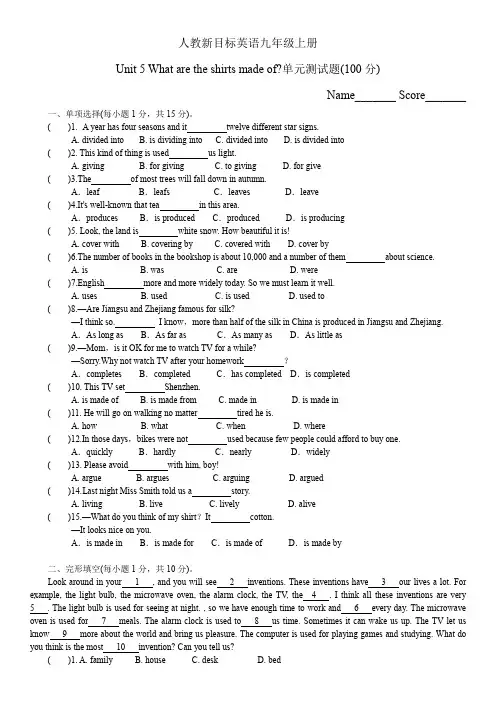
人教新目标英语九年级上册Unit 5 What are the shirts made of?单元测试题(100分)Name_______ Score_______一、单项选择(每小题1分,共15分)。
( )1.A year has four seasons and it twelve different star signs.A. divided intoB. is dividing intoC. divided intoD. is divided into( )2. This kind of thing is used us light.A. givingB. for givingC. to givingD. for give( )3.The of most trees will fall down in autumn.A.leaf B.leafs C.leaves D.leave( )4.It's wellknown that tea in this area.A.produces B.is produced C.produced D.is producing( )5. Look, the land is white snow. How beautiful it is!A. cover withB. covering byC. covered withD. cover by( )6.The number of books in the bookshop is about 10,000 and a number of them about science.A. isB. wasC. areD. were( )7.English more and more widely today. So we must learn it well.A. usesB. usedC. is usedD. used to( )8.—Are Jiangsu and Zhejiang famous for silk?—I think so. I know,more than half of the silk in China is produced in Jiangsu and Zhejiang.A.As long as B.As far as C.As many as D.As little as( )9.—Mom,is it OK for me to watch TV for a while?—Sorry.Why not watch TV after your homework ?A.completes B.completed C.has completed D.is completed( )10. This TV set Shenzhen.A. is made ofB. is made fromC. made inD. is made in( )11. He will go on walking no matter tired he is.A. howB. whatC. whenD. where( )12.In those days,bikes were not used because few people could afford to buy one.A.quickly B.hardly C.nearly D.widely( )13. Please avoid with him, boy!A. argueB. arguesC. arguingD. argued( )14.L ast night Miss Smith told us a story.A. livingB. liveC. livelyD. alive( )15.—What do you think of my shirt?It cotton.—It looks nice on you.A.is made in B.is made for C.is made of D.is made by二、完形填空(每小题1分,共10分)。
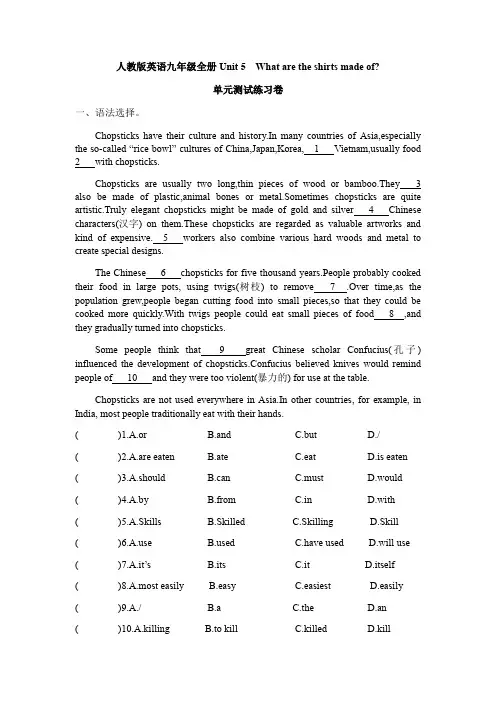
人教版英语九年级全册Unit 5 What are the shirts made of?单元测试练习卷一、语法选择。
Chopsticks have their culture and history.In many countries of Asia,especially the so-called “rice bowl” cultures of China,Japan,Korea,1Vietnam,usually food 2with chopsticks.Chopsticks are usually two long,thin pieces of wood or bamboo.They 3 also be made of plastic,animal bones or metal.Sometimes chopsticks are quite artistic.Truly elegant chopsticks might be made of gold and silver 4Chinese characters(汉字) on them.These chopsticks are regarded as valuable artworks and kind of expensive.5workers also combine various hard woods and metal to create special designs.The Chinese 6chopsticks for five thousand years.People probably cooked their food in large pots, using twigs(树枝) to remove 7.Over time,as the population grew,people began cutting food into small pieces,so that they could be cooked more quickly.With twigs people could eat small pieces of food 8,and they gradually turned into chopsticks.Some people think that 9great Chinese scholar Confucius(孔子) influenced the development of chopsticks.Confucius believed knives would remind people of 10and they were too violent(暴力的) for use at the table.Chopsticks are not used everywhere in Asia.In other countries, for example, in India, most people traditionally eat with their hands.( )1.A.or B.and C.but D./( )2.A.are eaten B.ate C.eat D.is eaten( )3.A.should B.can C.must D.would( )4.A.by B.from C.in D.with( )5.A.Skills B.Skilled C.Skilling D.Skill( )e ed C.have used D.will use( )7.A.it’s B.its C.it D.itself( )8.A.most easily B.easy C.easiest D.easily( )9.A./ B.a C.the D.an( )10.A.killing B.to kill C.killed D.kill三、完形填空。
精品基础教育教学资料,仅供参考,需要可下载使用!Unit12一.单项选择。
(15分)( )1. —Everyone wants to make money. But _______ me, the most important thing is to be happy.—I agree with you.A. such asB. thanks toC. instead ofD. as for( )2. _______ the time I got outside, the bus had already left.A.ByB. ForC. InD. On( )3. —Germany ended Brazil’s FIFA World Cup dream with a 7-1 semi-final (半决赛) victory.—The result was really ________.A. normalB. generalC. unexpectedD. impossible( )4. —When Miss Wang got to the station, the train had left. She ________ the train.—What a bad luck she had!A. pickedB. missedC. caughtD. lost( )5. _______ I got to the bus stop, the bus had already left.A. BeforeB. AfterC. As soon asD. Since( )6. —Are you going to Sydney by ______ train?—No, I am going to take ________ plane there.A. a; /B. / ; aC. a; theD. the; a( )7. —Mom, shall we have lunch now?—We won’t have lunch _______ your dad comes back.A. untilB. sinceC. whileD. when( )8. —What’s the result of the examination?—The teacher said that ________ of the students had passed the exam.A. four fiveB. fourth fivesC. fourth fifthsD. four fifths( )9. —How is the apple on the table?—It looks really nice, but it ________ sour.A. soundsB. feelsC. tastesD. looks( )10. —It’s time for class. Please stop ________. —Yes, sir.A. talkingB. to talkingC. to talkD. talk( )11. —Please remember to turn off the lights when you leave.—_________.A. Yes, I doB. No, thanksC. OK, I willD. Sorry, I won’t( )12. —Did you see the two boys on the playground?—Yes. But I saw one leave with a bike, and _______ playing basketball alone.A. anotherB. othersC. otherD. the other( )13. —Did you see the basketball star yesterday when he came to visit our school yesterday?—No, when I _____to school, he had already left.A. gotB. getC. had gotD. have got( )14. They were doing homework when the telephone _______.A.ringsB. was ringingC. rangD. has rangA.wentB.have goneC.goneD.had gone二.完形填空(每小题1分,共10分)It was time for a holiday! Dalia wanted to go to the beach, 1 her mum, dad and brother had other ideas. Where would Dalia’s family go on holiday?Suddenly, a golden envelope fell through the letter box. On the front it said “You’ve won!”“ 2 it!”shouted Mum, Dalia and Ahmed. Dad opened it. They had 3 a free holiday.“I hope it’s to the seaside,”said Dalia. “I can swim in the sea and make sand castles.”“No, I hope it’s a camping holiday,”said Dad. “I can sleep in a tent and get lots of 4 .”“No, I’d like to go on a cruise (乘船游览),”said Ahmed. “I can watch the dolphins and eat lots of nice food.”“Well, I’d like to go to a big city,”said Mum. “I can go shopping in the shopping mall and go to the theatre.”Then they started to argue. They couldn’t decide. Beach! Camping! Cruise! City! They argued 5 it was dark outside. Then the phone rang. Dalia answered it. “Hello, this is Lucky Holidays. You’ve won a holiday to sunny Alexandria. ”“That is 6 my grandmother lives.”“This is your grandma!”said Dalia’s grandma.“Oh my dear grandma, you 7 us!”replied Dalia. “You are all invited to spend your summer holiday with 8 ,”said her grandma.They packed their suitcases and spent two 9 weeks at the grandma’s home. Ahmed got his nice 10 . Dad got his fresh air. Mum went shopping and Dalia swam in the sea. Everyone was happy. ( )1. A. so B. or C. if D. but( )2. A. Open B. Close C. Throw D. Burn( )3. A. lost B. won C. discovered D. found( )4. A. fresh fruit B. clean water C. fresh air D. beautiful clothes( )5. A. while B. after C. before D. until( )6. A. where B. when C. how D. who( )7. A. stared B. heard C. fooled D. cancelled( )8. A. them B. you C. her D. me( )9. A. sad B. happy C. believable D. unexpected( )10. A. jacket B. tent C. food D. method三.阅读理解。
九年级英语Unit 4 I used to be afraid of the dark.单元测试一、单选题( )1.----There ______ a number of workers in the factory.----Yes. The number of women workers ______ 500.A.is, is B.are, is C.is,are D.are. are( )2.----James, can you tell me ______ ?----Paul ? I haven’t seen him for years. He used to be a shy boy.A.what is Paul like B.what Paul is like C.what does Paul like D.what Paul likes ( )3.We should learn how to ______ the relationship with our teachers and classmates.A.do with B.deal with C.give up D.give away ( )4.Mr. Wang used to ______ dinner outside, but now he is used to __meals with his family at home.A.have, eat B.have, eating C.having, eat D.having, eating ( )5.I ______ an English test yesterday. But I was not lucky and ______ the test.A.did, failed B.failed, passed C.took, failed D.passed, failed ( )6.—Have you ever read the traditional story YuGongMovesaMountain?—Yes.Our teacher often advises us ________ more meaningful traditional books.A.reading B.reads C.to read D.read( )7.Dale used to ______to office in his car,but he is used to ______the bus now.A.going;taking B.going;takeC.go;taking D.go take( )8. Great changes have taken place in Xiangyang.We are all ________ the achievements.A.known as B.proud ofC.similar to D.pride in( )9.Uncle Liang________eats out because his wife always makes delicious food for him.A.seldom B.sometimesA.such;that B.too;toC.so;that D.not;until)13.The best way of solving the problem is by asking the teacher for help.A.dealing withB.agreeing withC.looking upD.giving up)14.John used to be the last to leave school last month.A.was used toB.was oftenC.was usedD.got used to)15.The little girl has to take care of her grandmother and grandfather when her parents are out.二、完型填空Everyone changes in his or her life.Mostly these changes take place because of an experience. 21 me,high school was such an experience.High school has taught me about myself,and that is the most 22 lesson I have ever learned.I used to be quiet and 23 ,not wanting to show my inner self(内在自我).I would never talk aboutwas on my mind.I was afraid that someone would criticize(批评)me or tell me I was wrong.I cared too much about what others thought of me.Now I am no longer afraid to tell others my worries and let them know how I feel.I have changed a lot with the of my teachers and friends.They taught me that it is not a big deal to 26 in something as long as I have learned from my mistakes.By finding the courage(勇气)to believe in 27 ,I have become much 28 in mind.The thought of a challenge used to make me feel afraid, 29 now I want to work even harder to 30 the difficultiesASome people have a very poor sense of direction.Unluckily,I am one of them.I have visited a place many times but I may still get lost there the next time.When I was a little girl,I never dared to ask strangers the way.And so I used to walk round in circle and hope that by chance I would get to the place I was going to.Now,I am no longer too shy to ask people for directions,but I often receive helpless or even wrong information.So I try to avoid giving people wrong directions.If anyone asks me the way somewhere,I would "sorry,I am a stranger here."Once on my way to work,I was stopped by a man.He asked me if I could tell him the way to the Friendship Building.I gave him my usual reply.But just as I walked on only a few steps,I realized that he had asked the way to my office building.However,I had no time to turn back and look for him.I was rushing to meet with someone at my office and I didn't want to keep him waiting.B.The writer has a very poor sense of direction.C.The writer never got lost when she was young.D.The man was quite nervous when he saw the writer.BTen-year-old Johnny was one of the laziest boys in his class.He could never finish his homework on time.And there always were many mistakes in homework.One day his class went on a bus trip.The teacher didn't want to take Johnny with them.But there was no one to look after Johnny at the school,so she had to take him.“Now,children,”the teacher said.“On our bus trip we can see old buildings,some beautiful countryside many other things.I want you to write about everything you see on the trip.”The bus trip began.The children looked out of the windows at all the interesting things.They recorded notes in )3 9.What kind of person is Johnny?A.Hard-working.B.Lazy.C.Smart. D.Cute. )4 0.In this story,the word“recorded”means“ ____”.A.read B.spoke C.listened D.wrote C I know my brother better than anyone else in the world.Since the moment of his birth,I’ve been part of his life.Ispent seven happy years in the world with the attention of those around me.But when Rohan was born,life changed.All of a sudden,I had to share my toys and there were no more bedtime stories or my own choice of food.Finally,I hated this small boy.The poor baby had no idea what had made me so unhappy.Maybe he found strange,the only person in this house who did not like him.Whatever the reason was,he loved followingC.often talked to the babyD.never talked to the baby)43.The underlined phrase “that one moment” refers to the time .A.when there were no more bedtime stories for the sisterB.when the sister found herself in her brother’s room C.when Rohan softly touched his sister’s handD. when Rohan found herself in her brother’s room( )44.Which of the following is TRUE?A.The sister doesn’t know her brother very well.I passed the exam of history but f________ the exam of chemistry.Ann is a_______ today and Jack will give us the lesson instead of her.The g________ opinion is that the meeting was a success.Tomorrow we will have a Chinese e_______.Everyone works hard in the classroom.五、词汇运用用括号中所给单词的适当形式填空。
最新人教版九年级英语单元测试题全册 (14个单元,共14套,含答案) Unit 1 单元测试题
Ⅴ. 单项选择 从A、B、C、D四个选项中选择可以填入空白处的最佳答案。 ( ) 21. My cousin Mary was born ______ a singing voice. A. from B. in C. with D. at ( ) 22. —Lily, ______ do you practice your English?—By memorizing sentence patterns. A. why B. how C. when D. where ( ) 23. Alan, you can‟t go out to play ______ you clean your room. A. if B. because C. since D. unless ( ) 24. —Cindy, you learn physics so well. What‟s your ______?—Doing a lot of exercises. A. secret B. knowledge C. expression D. ability ( ) 25. If we don‟t use money ______, we‟ll have a difficult time. A. happily B. easily C. loudly D. wisely ( ) 26. It will take a lot of time, so you must be ______, young man. A. quiet B. patient C. creative D. active ( ) 27. Sorry, what did you say? I didn‟t hear. Would you mind ______ it? A. connecting B. reviewing C. copying D. repeating ( ) 28. There is much snow in the yard. ______ going out to make a snowman? A. What about B. Why not C. Would you like D. Could you please ( ) 29. David finds ______ difficult to communicate with his parents. A. one B. it C. this D. that ( ) 30. Peter is afraid ______ English in class because his pronunciation isn‟t good. A. speaking B. speak C. to speak D. to speaking ( ) 31. —I don‟t know what ______ for my little sister.—A skirt is OK. A. reading B. buying C. to read D. to buy ( ) 32. Is there a fast train to Beijing? Please help me ______. A. look it up B. look up it C. fix it up D. fix up it ( ) 33. Amy has no pens ______. She needs to buy some. A. to write B. writing C. to write with D. writing with ( ) 34. —Julie, don‟t talk with your deskmate. Please ______ what I‟m saying. —I‟m sorry, Mrs. Han. A. look forward to B. pay attention to C. check out D. bring out ( ) 35. —You should introduce yourself and start a conversation first. —______. You know I‟m a shy person. A. Sorry to hear that B. You‟re right C. I hope so D. That sounds difficult Ⅵ. 完形填空(每小题1分,共10分) 先通读下面短文,掌握其大意,然后从A、B、C、D四个选项中选择可以填入空白处的最佳答案。 Memorizing class notes is a good way to learn English. But what is the 36 way for you to memorize class notes? The 37 is difficult to answer, because different people learn in different ways and there are really too many ways. It also has 38 to do with the material (材料) to be memorized. I 39 a very good way to memorize class notes before. I typed (打字) the whole term‟s hand-written notes into a computer. 40 it took a lot of time, it was a good way. It made me 41 the material again. This way of memorizing class notes could also make me feel 42 , because it was an easy way. I just needed to start at the beginning of my notes and type to the end. There are many other good ways to memorize class notes. 43 , you can underline the important parts of your notes using different colored pens. When you 44 the notes, you will pay more attention to these parts. You can 45 make an outline (概要) of your notes, and then you will have a better understanding of each lesson. ( ) 36. A. newest B. cheapest C. safest D. best ( ) 37. A. problem B. question C. phone D. pattern ( ) 38. A. something B. somebody C. nothing D. nobody ( ) 39. A. needed B. forgot C. hated D. used ( ) 40. A. Because B. Although C. Until D. Unless ( ) 41. A. worry about B. talk about C. think about D. care about ( ) 42. A. nervous B. lucky C. relaxed D. bored ( ) 43. A. For example B. So far C. All in all D. In the end ( ) 44. A. report B. review C. return D. receive ( ) 45. A. again B. already C. always D. also Ⅶ. 情景交际(每小题1分,共5分) 根据对话内容,从方框中选出恰当的选项补全对话,其中有两项多余。 A: Li Mei, as a ninth-grade student, you must be very tired, right? B: Yes. We‟re going to take the most important examination and we must review every subject. A: (46) ______ B: No. I have to get up at a quarter past six every morning and go to bed very late. A: Why do you get up so early? B: (47) ______ A: Does your mother also get up so early? B: Yes. She cooks breakfast for me. (48) ______ A: Your mother is so kind. Well, how do you memorize English words? B: (49) ______ A: Sounds great. (50) ______ I want to learn from you. B: OK, if you think it will help. A. By making word cards. B. I have trouble learning new words. C. Do you feel tired? D. Can you get enough sleep every day? E. She wants me to keep healthy. F. What did you do? G. Because I have to memorize English words. Ⅷ. 阅读理解(每小题2分,共30分) ❋ A ❋ Liverpool Discover the best music, sport, culture ... in the UK Liverpool MUSIC The Beatles Story The world-famous 1960s music group came from Liverpool. Find out about The Beatles at the Beatles Story. Open every day except Dec. 25th and Liverpool SPORT Liverpool FC This city loves football. Visit Anfield football stadium, home of Liverpool FC, Liverpool‟s favorite football club, and take a tour.